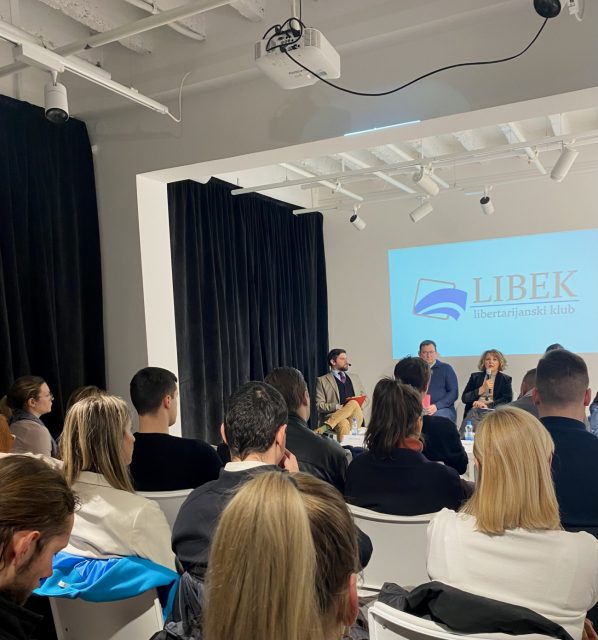Editors’ Note: Milos Nikolic is a member of the CIPE-supported Free Enterprise and Democracy Network and currently serves as President of Libek, a leading think tank in Serbia. Nikolic offers his opinions on the importance of engaging youth on decisions for the future and explains how his organization is doing that now.
In these difficult times for Europe, young people in Serbia believe less and less in the importance and usefulness of the European Union. According to the last survey of the National Youth Council of Serbia, in 2022, there was an increase in the number of those who oppose Serbia’s membership in the EU. The percentage of young people who oppose membership is 41%; only 33% support it, while 26% are undecided.
Serbia’s ascension to the EU is crucial for the further development of the country and improving standards of living, but the percentage of young people supporting it is smaller than the general public. Compared to youth’s 33% of support, the public stands at 43% support.
Without going into the reasons why this support is declining, especially among young people, it is important to note that young people are certainly very interested in economic issues that concern their future. If we specifically look at the list of topics that interest young people the most, after environmental issues (53.4%), in second place are economic topics related to employment, investments and the economic policy of the government in general (46.7%)
We in Libek strongly believe that Serbia must do more so that both young people and all citizens live much better. That is why the goal of our project Exploring Constructive Alternatives in a Volatile World was to offer the public in Serbia, and above all younger people, students, future leaders, social influencers and activists, political stories about economic successes that inspire and encourage action. The experiences of European countries comparable to Serbia were a special focus of our research stories and analyses.

Content about inspirational examples was followed by analyses of specific economic policies and measures that could also serve as a roadmap for Serbia. We have divided the content into several categories: lessons on the importance of regional economic integration and regional cooperation (for example the Benelux countries, the Nordic Council, the Baltic Assembly, the Visegrad Group); experiences of individual countries that are comparable to Serbia or can particularly inspire development (Slovakia, Romania, Estonia, Israel); and specific reform policies (taxes, investments, education, youth programs).
With the publication of this series, Libek drew national media attention and continued to increase our media presence. Since the foundation of our organization 15 years ago, 2022 has been a record year in terms of media influence. 80 out of 141 media hits in the form of television appearances or statements by our representatives during the last year, took place in the period of publication of the texts of this series (September 2022 – January 2023).
During that period of publication, about 45,000 users visited our media content, of which the youngest group (18 to 24 years old) made up about 15% of users. At the panel discussion that we organized about the future of our region, out of 27 participants, about 30% were under 25 years old. After a conversation with panelists and participants that lasted more than two hours, the main impression was that young people are especially interested in concrete and tangible things that can be achieved as a result of economic reforms. Also, issues related to regional economic integration and how our region can take advantage of nearshoring trends attract special attention.
There are some common conclusions from our authors that serve as lessons for the future of Serbia. Above all, the market economy followed by economic integrations – both at the regional and international level – contribute to the rise of political stability, the strengthening of the rule of law, and democracy. The special vulnerability of our societies is reflected in the low standard of living. For example, the combined GDP of all Western Balkan economies is lower than the GDP of Hungary. A key measure of the standard of living, GDP per capita in Bulgaria is about 20% higher than in Serbia. European examples of successful regional economic integrations, as well as lessons on public policies and reforms, can be an important political guide for all young people who want to engage in politics. After encountering these examples, youth will be equipped with new ideas that have led others to great economic success.
Our region of the Western Balkans is still perceived as unstable or as a region that still contains political and security challenges and risks. However, the Open Balkan initiative, started by Serbia, Albania, and North Macedonia in 2019, aims to create a common market in our region. The formation of a space in which there is complete freedom of movement of people, goods, services and capital has as its model both the European Union and other significant regional initiatives that have shown that economic cooperation leads to long-term prosperity of citizens.
Our efforts in this field do not end with this project. Libek continues to strongly advocate policies of regional economic integration and to encourage young people to actively participate in political discussions and activities with their ideas and proposals.
In this way, all of us work together to move our region forward and to search for new ways towards a common future. Meanwhile, content produced during project Exploring Constructive Alternatives in a Volatile World will remain an important and useful intellectual source of inspiration for travel in that direction.
Published Date: April 03, 2023
